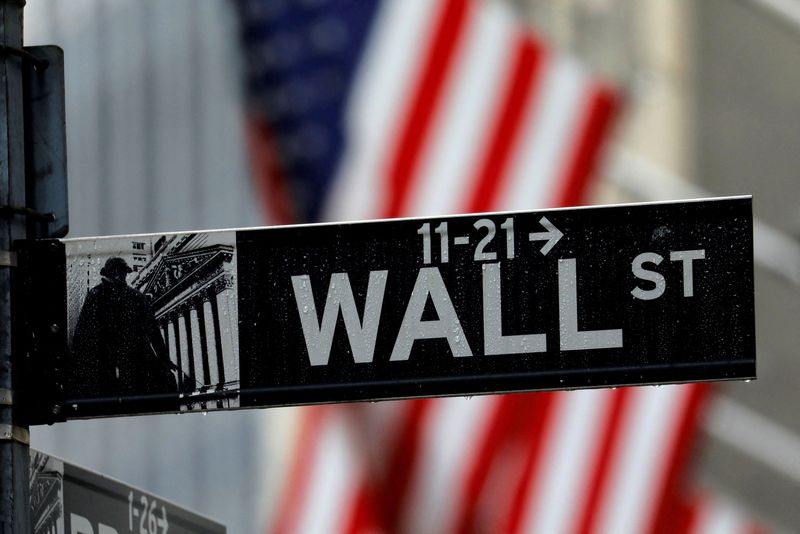NEW YORK (Reuters) -The climate, healthcare and tax bill passed by the U.S. Senate over the weekend could shave corporate earnings slightly and make companies pull forward their share repurchase plans, while giving a boost to some sectors like electric vehicle makers, biofuel and solar energy.
The $430 billion Inflation Reduction Act bill would impose a new excise tax on stock buybacks and a minimum 15% tax on corporations. The bill now heads to the Democratic-controlled House of Representatives, which is expected to pass it on Friday. It will then be signed into law by President Joe Biden. The tax changes would be effective from next year.
The two taxes are estimated to lower 2023 earnings per share of S&P 500 companies by roughly 1.5%, according to a research note by Goldman Sachs (NYSE:GS), which said that larger declines would be expected in low effective tax rate sectors such as healthcare and IT.
UBS's chief investment officer for the Americas, Solita Marcelli, similarly estimated the proposed new taxes would have "a very minimal 1% drag on S&P 500 earnings per share, although some companies will be more affected than others."
Some investors predicted a corporate buyback rush.
"The number one thing that stands out is that you're going to see an acceleration of buybacks before the end of this year," said Thomas Hayes, chairman and managing member of New York-based Great Hill Capital. "Companies would rather not pay that tax ... They have this window, and you can be assured they're going to take advantage of it."
Buybacks hit a record $281.0 billion in the first quarter of 2022, according to S&P analyst Howard Silverblatt, although they fell 17.4% in the second quarter.
Any rush to get buyback done this year could offer the market some more support as it rebounds from its mid-June lows, said Tim Ghriskey, senior portfolio strategist Ingalls & Snyder.
The S&P 500, about flat on Monday, has risen about 13% since hitting a year-and-a-half low in mid-June.
In the longer term, the 1% tax is unlikely to inhibit corporate buybacks, S&P's Silverblatt said.
Jaret Seiberg at Cowen Washington Research Group likewise said it was hard "to see companies changing their behavior" in response to the 1% tax. There is a risk, though, that taxing dividends becomes an "easy way to raise additional money" and that Congress raises the 1% in future, he added.
Meanwhile, higher corporate taxes also run the risk of squeezing corporate profit margins, John Petrides, portfolio manager at Tocqueville Asset Management, said.
"Higher taxes will reduce incentive to hire and could lead to more CapEx (Capital Expenditure) being spent on automation," Petrides said.
Some sectors, meanwhile, got a boost on Monday, with shares of U.S. automakers including Tesla (NASDAQ:TSLA) Inc, Rivian Automotive Inc, Ford Motor (NYSE:F) Co, General Motors Co (NYSE:GM) and Lordstown Motors Corp rising between 3% and 6% in afternoon trade.
The bill creates a $4,000 tax credit for used electric vehicles and provides billions in funding for EV production.
"Some of the subsidies and incentives for EVs will be helpful and will help Ford and GM and Teslas of the world to get more orders," said Hayes. He added that the biggest beneficiary will be Tesla.
Biotech and pharma stocks should rebound after some uncertainty because the bill is "less onerous than initially anticipated as it relates to negotiating drug prices," Hayes said.
Peter Tuz, president of Chase Investment Counsel in Charlottesville, Virginia, said the bill is only marginally negative for the healthcare industry.
"It phases in over time and only affects a few drugs, so the devil's in the details," he said.

Shares of biofuel producers, including Darling Ingredients (NYSE:DAR), Neste, Gevo (NASDAQ:GEVO) Inc, expected to benefit from the extension of the biofuel blenders tax credit and addition of sustainable aviation fuel tax credits included in the Act, rose on Monday before giving up gains to trade little changed on the day.
Meanwhile, First Solar Inc (NASDAQ:FSLR) shares rose on analyst upgrades in the wake of the Senate passing the bill.